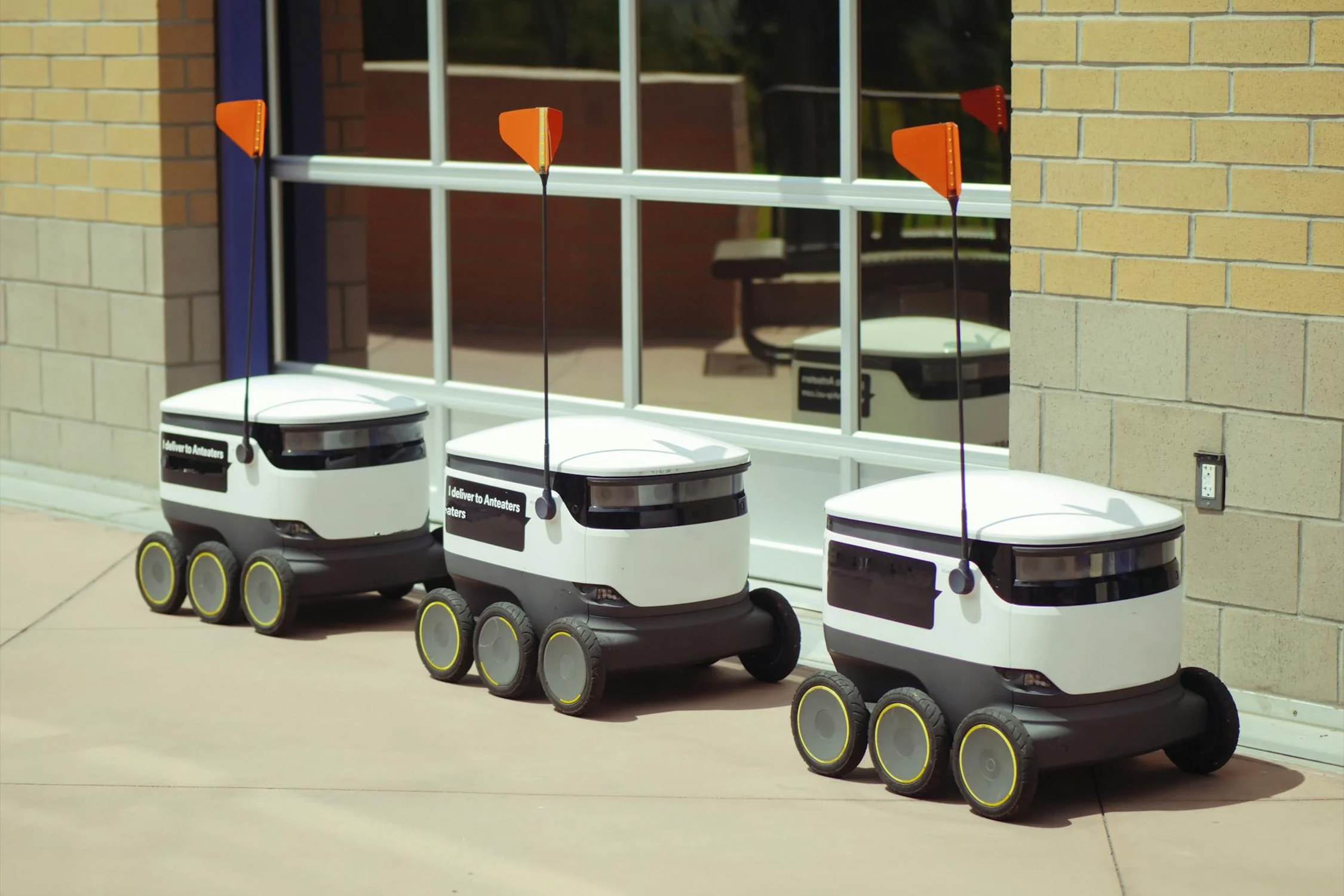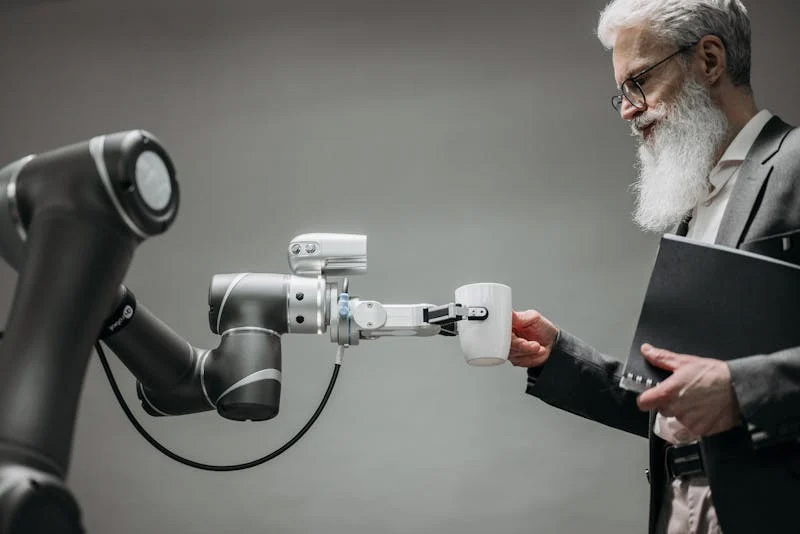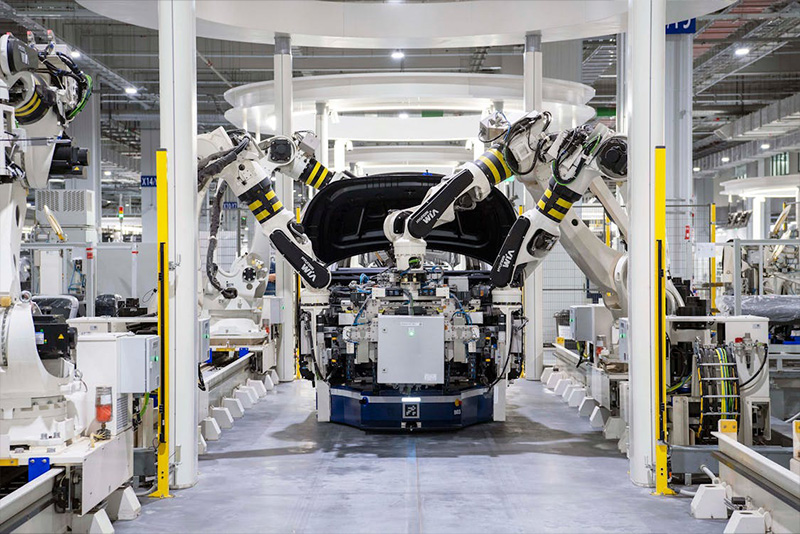The rapid advancement of AI and the growing implementation of robotics is transforming industries at an unprecedented rate. While these technologies promise increased efficiency and innovation, they also pose significant challenges to employment and the way we’ve come to understand careers. As machines take over tasks traditionally performed by humans, the fear of widespread job displacement grows. In this article, I’ll be exploring the potential impact of AI and robots on the workforce and examine how the concept of Universal Basic Income (UBI) could serve as a viable solution to this looming issue.
The Impact of AI and Robots on Employment
AI and robotics are revolutionising various sectors, automating tasks that were once manual and repetitive. However, this shift brings with it concerns about job security for millions of workers, and in many cases their worries are valid. There are many ways that AI and robots are affecting employment, and as such potential long-term implications need to be acknowledged and addressed.
Manufacturing
Manufacturing has always been at the forefront of technological innovation, and it has been since the Industrial Revolution in the 1700s. Now, the introduction of automation in factories is leading to the replacement of assembly line workers with robots. These machines can perform repetitive tasks with high precision and speed, resulting in significant job losses for human workers. While there’s an economic advantage of increased productivity and reduced production costs, it also means there are fewer jobs available for those without specialised skills.
Customer Service
The customer service industry is also feeling the effects of AI and robotics. AI-powered chatbots and virtual assistants are increasingly handling customer inquiries, reducing the need for human agents. These AI systems can provide instant responses and resolve issues efficiently, to the point that now, in many cases, human intervention is no longer required. This shift while convenient for end-users means that many customer service representatives may soon find themselves out of work, facing the challenge of retraining for new roles.
Transportation
Yet another industry undergoing a major transformation due to AI and robotics is transportation. Self-driving vehicles and drones are set to disrupt the logistics and delivery sectors, potentially displacing drivers and couriers. While these technologies promise safer and more efficient transportation, they also threaten the livelihoods of individuals who rely on driving jobs to support their families.
The Case for Universal Basic Income (UBI)
Universal Basic Income (UBI) proposes a fixed income for all citizens, regardless of employment status, to ensure financial stability amidst technological disruptions and job changes. It’s a concept that’s gained traction as a potential solution to mitigate the economic impact of job displacement and it’s well worth exploring the benefits and challenges of UBI.
Economic Security
One of the primary benefits of UBI is economic security. By providing a safety net for individuals who lose their jobs due to automation, UBI ensures that everyone has a basic level of financial stability. This can help reduce poverty and inequality, as well as alleviate the stress and anxiety associated with job loss or change.
Encourages Innovation
UBI also encourages innovation by giving individuals the freedom to pursue entrepreneurial ventures and further education. With their basic financial needs covered, people may feel more confident taking risks and exploring new opportunities. This can lead to the creation of new businesses and industries, driving economic growth and development.
Reduces Poverty
Another key benefit of UBI is its potential to reduce poverty. By providing a steady income to the unemployed and underemployed, UBI helps to ensure that everyone has access to essential resources and services. This aspect alone can improve overall quality of life and contribute to a more inclusive and equitable society.
Adapting to the Changing Job Market
As AI and robots continue to evolve, anticipating and adapting to change is going to be crucial for both workers and employers. Strategies will have to be implemented to help individuals and organisations navigate the transition to a tech-driven job market.
Upskilling and Reskilling
Investing in education and training programs can help workers acquire new skills that are in demand in the tech-driven job market. For example, learning programming, data analysis, and AI development will open up new career opportunities. Additionally, enhancing other human-centric skills such as critical thinking, creativity, and emotional intelligence can help workers remain competitive in roles that are less likely to be automated.
Embracing Lifelong Learning
The concept of lifelong learning emphasises continuous skill development throughout one’s career. This approach ensures workers seek to remain adaptable and competitive in a rapidly changing job landscape. Employers can support lifelong learning by offering training programs, workshops, and resources to help employees stay current with industry trends and technologies.
Supporting Small Businesses and Entrepreneurship
Encouraging the growth of small businesses and startups will be instrumental in creating new job opportunities. Governments and organisations can support this by providing resources, funding, and mentorship programs. By fostering a culture of innovation and entrepreneurship, it will be possible to create a resilient and diverse job market that’s better equipped to handle the challenges posed by AI and automation.
Navigating the Future of Work
The integration of AI and robots into the workforce presents both opportunities and challenges. And while these technologies can drive progress and efficiency, they’ll also threaten job security for many workers. Universal Basic Income offers a promising solution to support those affected by automation, ensuring economic stability and fostering innovation. By investing in education, promoting lifelong learning, and supporting entrepreneurship, we can adapt to this new era and create a resilient and inclusive job market.
The Role of Policy Makers
Policy makers will play an increasingly crucial role in shaping the future of work. By enacting policies that support UBI, education, and small businesses, they can help create a framework that promotes economic stability and growth. Additionally, policy makers can work to ensure that AI and robotics are developed and implemented ethically and responsibly, prioritising the well-being of workers and society as a whole.
Building a Collaborative Future
Collaboration between governments, businesses, and workers will be essential for navigating the future of work. By working together to address the challenges posed by AI and automation, we should be able to collectively create a more inclusive and resilient job market. This will mean fostering open communication, sharing best practices, and developing innovative solutions to support workers and businesses alike.
The Ethical Implications of AI and Robotics
As we integrate AI and robotics into various sectors, it’s crucial to consider the ethical implications of these technologies. Ensuring that AI and robots are developed and used responsibly is essential for maintaining public trust and promoting a fair and just society.
Fairness and Bias
One of the primary ethical concerns related to AI is the potential for bias and discrimination. AI systems are often trained on large datasets, which can contain biases that are inadvertently learned by the algorithms. This can lead to the unfair treatment of certain groups and exacerbate existing inequalities. To address this issue, developers must prioritise fairness and transparency in AI design, training and implementation.
Privacy and Security
Privacy and security are also significant ethical considerations when it comes to AI and robotics. The widespread use of AI often involves the collection and analysis of vast amounts of personal data. Ensuring that this data is handled securely and used ethically is crucial for protecting individuals’ privacy and maintaining public trust in these technologies.
Accountability
Finally, accountability is an essential aspect of the ethical use of AI and robotics. As these technologies become more integrated into our daily lives, it’s important to establish clear guidelines for responsibility and accountability. This includes ensuring that developers, businesses, and policy makers are held accountable for the ethical use of AI and robotics.
Preparing for the Future
Preparing for the future of work will require a proactive approach from all stakeholders and committed collaboration between governments, businesses, and workers is going to be essential. By working together to address the challenges posed by AI and automation, we’ll be able to create a more inclusive and resilient job market that integrates innovative solutions to support workers and businesses alike.
A Vision for the Future
The future of work is undoubtedly going to be shaped by AI and robotics. While these technologies already present significant challenges, they also offer immense opportunities for growth and innovation. By proactively addressing the potential impacts, we can create a job market that is resilient, inclusive, and adaptable to these changes.
To further explore how AI and robots are shaping the future of work and to discuss how your business can adapt, contact me via my social channels or visit www.colinmbcooper.com. I’m here to help you navigate these opportunities and challenges and am looking forward to what lies ahead.
Frequently Asked Questions (FAQs)
What is Universal Basic Income (UBI)?
Universal Basic Income (UBI) is a financial support system in which all citizens receive a regular, unconditional sum of money from the government, regardless of their employment. This initiative aims to provide economic security and reduce poverty, especially in an era where jobs may be displaced by automation.
How can businesses support lifelong learning?
Businesses can support lifelong learning by offering training programs, workshops, mentorship, and access to online resources. Investing in employee development helps retain talent and ensures workers are equipped with the skills needed in a rapidly evolving job market.
What are the main ethical concerns associated with AI?
The main ethical concerns related to AI include fairness and bias, privacy and security, and accountability. These issues arise from the potential for biased algorithms, the handling of personal data, and the responsibility of developers and organisations in the ethical deployment of AI technologies.
How can policy makers ensure the responsible development of AI?
Policy makers can ensure the responsible development of AI by enacting regulations that promote fairness, transparency, and accountability. They should also engage with stakeholders, including industry experts and civil society, to create guidelines that prioritise ethical considerations in AI development and implementation.
What role do small businesses play in the economy?
Small businesses are crucial to the economy as they create jobs, drive innovation, and contribute to local communities. Supporting small businesses and entrepreneurship can lead to a more resilient and diverse job market, helping to fill gaps left by larger corporations. Therefore, it’s important for governments and larger companies to collaborate with small businesses to create a more inclusive and sustainable economy.
How can workers prepare for the future of work?
People can prepare for the future of work by continuously upskilling and adapting to new technologies. This includes being open to learning new skills, being adaptableand flexible in job roles, and staying informed about industry developments. Additionally, advocating for policies that support worker rights and protections can also help workers navigate the changing landscape of work. Overall, it’s important for individuals to be proactive in preparing for the future rather than simply reacting to changes as they occur.The rapid advancement of AI and the growing implementation of robotics is transforming industries at an unprecedented rate. While these technologies promise increased efficiency and innovation, they also pose significant challenges to employment and the way we’ve come to understand careers. As machines take over tasks traditionally performed by humans, the fear of widespread job displacement grows. In this article, I’ll be exploring the potential impact of AI and robots on the workforce and examine how the concept of Universal Basic Income (UBI) could serve as a viable solution to this looming issue.
The Impact of AI and Robots on Employment
AI and robotics are revolutionising various sectors, automating tasks that were once manual and repetitive. However, this shift brings with it concerns about job security for millions of workers, and in many cases their worries are valid. There are many ways that AI and robots are affecting employment, and as such potential long-term implications need to be acknowledged and addressed.
Manufacturing
Manufacturing has always been at the forefront of technological innovation, and it has been since the Industrial Revolution in the 1700s. Now, the introduction of automation in factories is leading to the replacement of assembly line workers with robots. These machines can perform repetitive tasks with high precision and speed, resulting in significant job losses for human workers. While there’s an economic advantage of increased productivity and reduced production costs, it also means there are fewer jobs available for those without specialised skills.
Customer Service
The customer service industry is also feeling the effects of AI and robotics. AI-powered chatbots and virtual assistants are increasingly handling customer inquiries, reducing the need for human agents. These AI systems can provide instant responses and resolve issues efficiently, to the point that now, in many cases, human intervention is no longer required. This shift while convenient for end-users means that many customer service representatives may soon find themselves out of work, facing the challenge of retraining for new roles.
Transportation
Yet another industry undergoing a major transformation due to AI and robotics is transportation. Self-driving vehicles and drones are set to disrupt the logistics and delivery sectors, potentially displacing drivers and couriers. While these technologies promise safer and more efficient transportation, they also threaten the livelihoods of individuals who rely on driving jobs to support their families.
The Case for Universal Basic Income (UBI)
Universal Basic Income (UBI) proposes a fixed income for all citizens, regardless of employment status, to ensure financial stability amidst technological disruptions and job changes. It’s a concept that’s gained traction as a potential solution to mitigate the economic impact of job displacement and it’s well worth exploring the benefits and challenges of UBI.
Economic Security
One of the primary benefits of UBI is economic security. By providing a safety net for individuals who lose their jobs due to automation, UBI ensures that everyone has a basic level of financial stability. This can help reduce poverty and inequality, as well as alleviate the stress and anxiety associated with job loss or change.
Encourages Innovation
UBI also encourages innovation by giving individuals the freedom to pursue entrepreneurial ventures and further education. With their basic financial needs covered, people may feel more confident taking risks and exploring new opportunities. This can lead to the creation of new businesses and industries, driving economic growth and development.
Reduces Poverty
Another key benefit of UBI is its potential to reduce poverty. By providing a steady income to the unemployed and underemployed, UBI helps to ensure that everyone has access to essential resources and services. This aspect alone can improve overall quality of life and contribute to a more inclusive and equitable society.
Adapting to the Changing Job Market
As AI and robots continue to evolve, anticipating and adapting to change is going to be crucial for both workers and employers. Strategies will have to be implemented to help individuals and organisations navigate the transition to a tech-driven job market.
Upskilling and Reskilling
Investing in education and training programs can help workers acquire new skills that are in demand in the tech-driven job market. For example, learning programming, data analysis, and AI development will open up new career opportunities. Additionally, enhancing other human-centric skills such as critical thinking, creativity, and emotional intelligence can help workers remain competitive in roles that are less likely to be automated.
Embracing Lifelong Learning
The concept of lifelong learning emphasises continuous skill development throughout one’s career. This approach ensures workers seek to remain adaptable and competitive in a rapidly changing job landscape. Employers can support lifelong learning by offering training programs, workshops, and resources to help employees stay current with industry trends and technologies.
Supporting Small Businesses and Entrepreneurship
Encouraging the growth of small businesses and startups will be instrumental in creating new job opportunities. Governments and organisations can support this by providing resources, funding, and mentorship programs. By fostering a culture of innovation and entrepreneurship, it will be possible to create a resilient and diverse job market that’s better equipped to handle the challenges posed by AI and automation.
Navigating the Future of Work
The integration of AI and robots into the workforce presents both opportunities and challenges. And while these technologies can drive progress and efficiency, they’ll also threaten job security for many workers. Universal Basic Income offers a promising solution to support those affected by automation, ensuring economic stability and fostering innovation. By investing in education, promoting lifelong learning, and supporting entrepreneurship, we can adapt to this new era and create a resilient and inclusive job market.
The Role of Policy Makers
Policy makers will play an increasingly crucial role in shaping the future of work. By enacting policies that support UBI, education, and small businesses, they can help create a framework that promotes economic stability and growth. Additionally, policy makers can work to ensure that AI and robotics are developed and implemented ethically and responsibly, prioritising the well-being of workers and society as a whole.
Building a Collaborative Future
Collaboration between governments, businesses, and workers will be essential for navigating the future of work. By working together to address the challenges posed by AI and automation, we should be able to collectively create a more inclusive and resilient job market. This will mean fostering open communication, sharing best practices, and developing innovative solutions to support workers and businesses alike.
The Ethical Implications of AI and Robotics
As we integrate AI and robotics into various sectors, it’s crucial to consider the ethical implications of these technologies. Ensuring that AI and robots are developed and used responsibly is essential for maintaining public trust and promoting a fair and just society.
Fairness and Bias
One of the primary ethical concerns related to AI is the potential for bias and discrimination. AI systems are often trained on large datasets, which can contain biases that are inadvertently learned by the algorithms. This can lead to the unfair treatment of certain groups and exacerbate existing inequalities. To address this issue, developers must prioritise fairness and transparency in AI design, training and implementation.
Privacy and Security
Privacy and security are also significant ethical considerations when it comes to AI and robotics. The widespread use of AI often involves the collection and analysis of vast amounts of personal data. Ensuring that this data is handled securely and used ethically is crucial for protecting individuals’ privacy and maintaining public trust in these technologies.
Accountability
Finally, accountability is an essential aspect of the ethical use of AI and robotics. As these technologies become more integrated into our daily lives, it’s important to establish clear guidelines for responsibility and accountability. This includes ensuring that developers, businesses, and policy makers are held accountable for the ethical use of AI and robotics.
Preparing for the Future
Preparing for the future of work will require a proactive approach from all stakeholders and committed collaboration between governments, businesses, and workers is going to be essential. By working together to address the challenges posed by AI and automation, we’ll be able to create a more inclusive and resilient job market that integrates innovative solutions to support workers and businesses alike.
A Vision for the Future
The future of work is undoubtedly going to be shaped by AI and robotics. While these technologies already present significant challenges, they also offer immense opportunities for growth and innovation. By proactively addressing the potential impacts, we can create a job market that is resilient, inclusive, and adaptable to these changes.
To further explore how AI and robots are shaping the future of work and to discuss how your business can adapt, contact me via my social channels or visit www.colinmbcooper.com. I’m here to help you navigate these opportunities and challenges and am looking forward to what lies ahead.
Frequently Asked Questions (FAQs)
What is Universal Basic Income (UBI)?
Universal Basic Income (UBI) is a financial support system in which all citizens receive a regular, unconditional sum of money from the government, regardless of their employment. This initiative aims to provide economic security and reduce poverty, especially in an era where jobs may be displaced by automation.
How can businesses support lifelong learning?
Businesses can support lifelong learning by offering training programs, workshops, mentorship, and access to online resources. Investing in employee development helps retain talent and ensures workers are equipped with the skills needed in a rapidly evolving job market.
What are the main ethical concerns associated with AI?
The main ethical concerns related to AI include fairness and bias, privacy and security, and accountability. These issues arise from the potential for biased algorithms, the handling of personal data, and the responsibility of developers and organisations in the ethical deployment of AI technologies.
How can policy makers ensure the responsible development of AI?
Policy makers can ensure the responsible development of AI by enacting regulations that promote fairness, transparency, and accountability. They should also engage with stakeholders, including industry experts and civil society, to create guidelines that prioritise ethical considerations in AI development and implementation.
What role do small businesses play in the economy?
Small businesses are crucial to the economy as they create jobs, drive innovation, and contribute to local communities. Supporting small businesses and entrepreneurship can lead to a more resilient and diverse job market, helping to fill gaps left by larger corporations. Therefore, it’s important for governments and larger companies to collaborate with small businesses to create a more inclusive and sustainable economy.
How can workers prepare for the future of work?
People can prepare for the future of work by continuously upskilling and adapting to new technologies. This includes being open to learning new skills, being adaptableand flexible in job roles, and staying informed about industry developments. Additionally, advocating for policies that support worker rights and protections can also help workers navigate the changing landscape of work. Overall, it’s important for individuals to be proactive in preparing for the future rather than simply reacting to changes as they occur.






